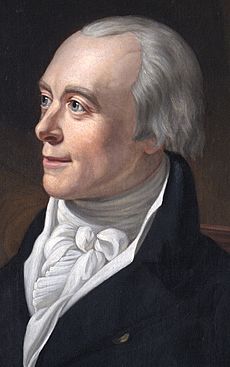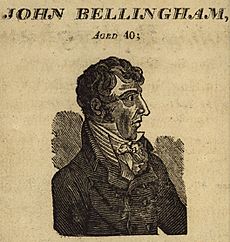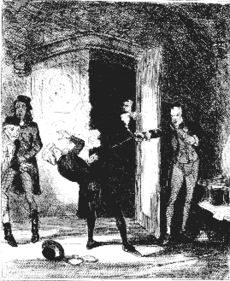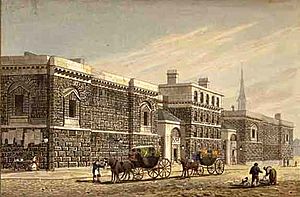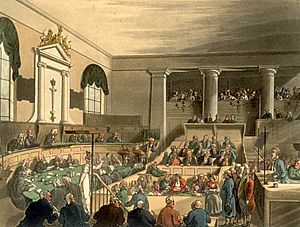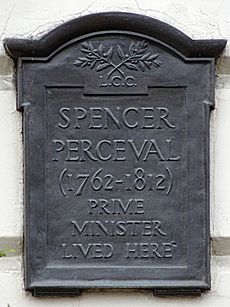Assassination of Spencer Perceval facts for kids
Quick facts for kids Assassination of Spencer Perceval |
|
|---|---|
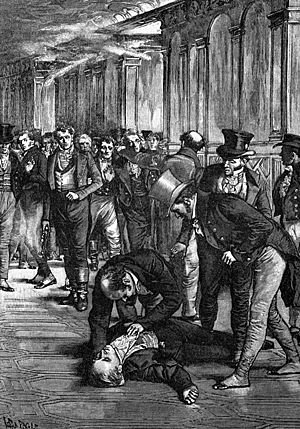
A picture from 1909 showing what happened right after Perceval was shot on May 11, 1812.
|
|
| Location | House of Commons, London, England |
| Date | 11 May 1812 c. 5:15 pm |
| Target | Spencer Perceval |
|
Attack type
|
|
| Weapon | .50 calibre (12.7 mm) pistol |
| Motive |
|
On May 11, 1812, something shocking happened in London. Spencer Perceval, who was the Prime Minister of the United Kingdom, was shot and killed. This happened in the lobby of the House of Commons. The person who shot him was John Bellingham, a merchant from Liverpool. Bellingham was angry with the government.
He was quickly caught. Just four days after the shooting, Bellingham was put on trial. He was found guilty and sentenced to death. He was hanged at Newgate Prison on May 18, only one week after the Prime Minister's death. Spencer Perceval is still the only British Prime Minister ever to be assassinated.
Perceval had been leading the government since 1809. This was a very difficult time because of the Napoleonic Wars. His strong decisions about the war caused a lot of poverty and unhappiness in the country. Because of this, many people were actually happy when they heard he had died. At first, people worried the shooting was part of a bigger uprising. But it turned out Bellingham acted alone. He was protesting because the government had not helped him after he was unfairly put in prison in Russia for a business debt.
Bellingham showed no regret and seemed sure he was right. This made people wonder if he was mentally unwell. However, at his trial, he was judged responsible for his actions. After Perceval's death, Parliament gave money to his wife and children. They also approved building monuments to remember him. But his time as Prime Minister was soon forgotten. Many of his policies were changed. Today, he is mostly remembered for how he died, not for what he achieved. Some historians later said that Bellingham's quick trial and execution were not fair. A study in 2012 even suggested he might have been part of a secret plan. This plan might have involved Liverpool traders who disliked Perceval's economic rules.
Who Were They?
Spencer Perceval's Story
Spencer Perceval was born on November 1, 1762. He was the second son from his father's second marriage. He went to Harrow School and then Trinity College, Cambridge. There, he was a very good student. He was also very religious and stayed that way his whole life.
Because he was a younger son, Spencer would not inherit much family money. So, he needed to earn a living. After college, he studied to become a lawyer. He became a lawyer in 1786 and quickly found success. In 1790, he married Jane Wilson. They had a very happy marriage and twelve children!
Perceval had very traditional political views. He was known for speaking out against radical ideas. Important politicians noticed him when he defended the government in court. In 1796, he became a member of Parliament for Northampton. He was seen as a rising star in his party. Because he was short and thin, people sometimes called him "Little P."
After 1801, Perceval held important legal jobs in the government. He was the Solicitor General and then the Attorney General. His strong religious beliefs made him against the Roman Catholic Church and Catholic emancipation. But he strongly supported ending the slave trade. He worked with others, like William Wilberforce, to pass the Slave Trade Act 1807. This law made the slave trade illegal.
In 1807, Perceval became the Chancellor of the Exchequer. This meant he was in charge of the country's money. In 1809, he became the First Lord of the Treasury. This was the official title for the Prime Minister back then. He kept the Chancellor job too, because he couldn't find anyone else suitable.
Tough Times for the Country
Perceval's government faced huge problems. There was a lot of unrest in factories. The country was also struggling in the war against Napoleon. The British army was stuck in Portugal. At first, King George III strongly supported Perceval. But in 1810, the king became mentally ill. Then, the Prince of Wales became the prince regent. Their relationship was not good at first, but they later got along better.
Perceval insisted that the army stay in Portugal. Most of his ministers disagreed, and it cost a lot of money. But this decision eventually helped Britain win the war. His main weapon against Napoleon was the "Orders in Council." These rules allowed the Royal Navy to stop any ship thought to be carrying goods to France. Both sides used similar tactics, which hurt world trade. This caused hardship in British industries, especially textiles. Many people wanted these rules changed or removed. They also hurt relations with the United States, almost leading to war by 1812.
At home, Perceval continued to oppose radical groups. He even put some leaders in prison. He also faced protests from "Luddites." These were people who destroyed machines because they feared losing their jobs. Perceval made machine-breaking a crime punishable by death. Despite these problems, Perceval became very powerful. By May 1812, his political position was very strong. People were protesting his harsh policies, but he was secure in his job.
In early 1812, more people demanded that the Orders in Council be removed. After riots in Manchester in April, Perceval agreed to a Parliament investigation. Hearings began in May. Perceval was expected to attend a session on May 11, 1812. In the lobby, waiting for him, was a Liverpool merchant named John Bellingham.
John Bellingham's Story
John Bellingham was born around 1770. His father was a land agent and painted small portraits. His father became mentally ill and died when John was young. John's uncle helped him get a job as an officer cadet on a ship. The ship had a mutiny and was wrecked, but Bellingham survived.
His uncle then helped him start a business in London. But the business failed, and Bellingham went bankrupt in 1794. He managed to avoid going to a debtors' prison. After this, he got a job as a book-keeper for a company that traded with Russia. He worked hard and was sent to Russia in 1800. When he returned, he started his own trading business in Liverpool. In 1803, he married Mary Neville.
Trouble in Russia
In 1804, Bellingham went back to Russia for a big business deal. He was with his wife and baby son. When he was ready to leave, he was stopped. He was told he owed money for a business partner's losses. Bellingham said he wasn't responsible. He believed powerful Russian merchants were trying to get revenge on him. Two judges said he owed about £200, but Bellingham refused to pay.
He tried to go to the Russian capital, St Petersburg, but his travel pass was taken away. His wife and child could go, but he was arrested and put in prison. He asked the British ambassador for help, but was told they couldn't interfere with a private debt. Bellingham stayed in prison until November 1805. Then, a new governor ordered his release.
In St Petersburg, Bellingham decided to sue the Russian authorities for false imprisonment. This made the Russians angry, and they put him in prison again in June 1806. He later said he was "often marched publicly through the city with gangs of felons." His wife had returned to England with their son. For three years, Bellingham kept asking for release and money. No one helped him. Finally, after writing directly to the Russian leader, Tsar Alexander, he was released in December 1809. He returned to England without any money, determined to get justice.
Seeking Justice
Back in England, Bellingham spent six months in London. He wanted money for his time in prison and his business losses in Russia. He felt the British government was to blame because they didn't help him. He wrote to many government offices, including the Foreign Office and the Treasury. He even wrote to Prime Minister Perceval himself. But his requests were always politely turned down.
Feeling defeated, Bellingham went back to Liverpool in May 1811. His wife had told him to give up his fight or she would leave him. He tried to restart his business, with some success. But he was still angry about not getting compensation. In December 1811, he returned to London. He said it was for business, but he really wanted to continue his fight for justice.
He wrote to the Prince Regent and tried the government offices again. He got the same polite refusals. He then sent a copy of his request to every member of Parliament, but it didn't help. On March 23, 1812, Bellingham wrote to the Bow Street Magistrates' Court. He said the government had "closed the door of justice" on him. He got a short reply.
After talking to his own Member of Parliament, Bellingham made one last attempt. On April 18, he met with a Treasury official. Bellingham told him that if he didn't get justice, he would take matters into his own hands. The official didn't see this as a threat and told him to do what he thought was right. On April 20, Bellingham bought two pistols. He also had a tailor sew a special inside pocket into his coat.
The Assassination
The Shooting at the House of Commons
Bellingham had visited the House of Commons lobby several times before May 11. So, his presence there didn't seem unusual. He had spent the morning writing letters and visiting a friend. In the afternoon, he went to a museum with his landlady. From there, he went alone to the Palace of Westminster. He arrived in the lobby just before 5:00 pm.
Inside the House, the meeting started at 4:30 pm. A Member of Parliament pointed out that Perceval was not there. A messenger was sent to get Perceval from Downing Street. But Perceval was already walking to the House. He arrived around 5:15 pm. As Perceval entered the lobby, Bellingham stepped forward. He pulled out a pistol and shot the Prime Minister in the chest.
Perceval stumbled a few steps and cried out, "I am murdered!" He then fell face down at the feet of William Smith, another MP. Smith first thought it was his friend, William Wilberforce, who had been shot. When he turned the body over, he realized it was Perceval. Perceval was carried into the Speaker's room. He was unconscious, but still had a faint pulse. When a surgeon arrived minutes later, Perceval had died.
After the shooting, there was chaos. Bellingham calmly sat on a bench. A witness said that if Bellingham had just walked away, no one would have known who did it. But an official who saw the shooting identified Bellingham. He was grabbed, disarmed, and searched. He remained calm and didn't fight. When asked why he did it, Bellingham said he was correcting a denial of justice by the government.
Bellingham was taken to another room for a hearing. He remained calm. Even though he was warned not to say anything that could be used against him, he insisted on explaining himself. He said he had been "ill-treated" and had tried everything to get justice. He had told the authorities he would take action himself. He said they told him to do his worst. "I have obeyed them," he said. "I have done my worst, and I rejoice in the deed." Around 8:00 pm, Bellingham was officially charged with murder. He was sent to Newgate Prison to wait for his trial.
How People Reacted
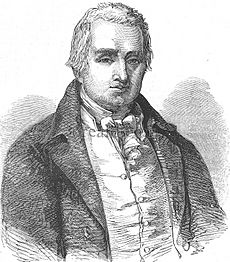
News of the assassination spread quickly. Many poor workers, who had suffered under Perceval's government, were actually happy. A writer named William Cobbett, who was in prison, understood their feelings. He said the shooting "ridded them of one whom they looked upon as the leader among those whom they thought totally bent on the destruction of their liberties."
Outside the Palace of Westminster, when Bellingham was taken to Newgate, the mood was similar. A lawyer named Samuel Romilly heard "savage expressions of joy" from the crowd. People were also sad that others, like the Attorney General, hadn't been shot too. The crowd rushed around the carriage carrying Bellingham. Many tried to shake his hand. Others climbed onto the carriage and had to be pushed off. Bellingham was quickly taken back inside until the crowd calmed down. He was then moved with a military escort.
Among the ruling class, there were fears that the assassination was part of a bigger uprising. Soldiers and police were sent out. But unlike the public, Perceval's friends and colleagues were very sad. When Parliament met the next day, they spoke highly of him. They said he had never made a single enemy, despite political disagreements. Parliament then voted to give £50,000 and an annual payment of £2,000 to Perceval's widow.
The Trial and Execution
Before the Trial
An investigation into Perceval's death was held on May 12. Witnesses said that Bellingham seemed "perfectly sane" after the shooting. The investigation concluded that John Bellingham had "wilfully murdered" Spencer Perceval. The Attorney General asked for the trial to happen as soon as possible.
In Newgate Prison, Bellingham was questioned. His calm behavior made some people doubt his sanity. However, his jailers saw no signs of mental illness. Bellingham's lawyer knew that claiming insanity was his only defense. He sent people to Liverpool to gather information. He also learned that Bellingham's father had died mentally ill.
On May 14, a grand jury decided there was enough evidence to charge Bellingham with murder. The trial was set for the next day, Friday, May 15, 1812, at the Old Bailey. When Bellingham heard about his trial, he asked for two lawyers to represent him. He was confident he would be found innocent. He refused to discuss the case further with his lawyer. He spent the evening writing notes and slept well.
The Trial Day
Bellingham's trial began on May 15, 1812. The judge was Sir James Mansfield. The prosecution team was led by the Attorney General. Bellingham had lawyers, but back then, lawyers could only advise in murder cases. Bellingham had to present most of his own defense.
Bellingham said he was not guilty. His lawyer asked for the trial to be delayed. He wanted more time to find witnesses who could say Bellingham was insane. But the judge refused, saying it was just a trick to delay justice. The trial went ahead. The Attorney General then described Bellingham's business problems in Russia. He said Bellingham's desire for revenge grew from these problems.
The Attorney General said Bellingham was fully in control of his actions when he shot Perceval. Many witnesses described what they saw in the House of Commons lobby. A tailor also testified. He had sewn a special inside pocket into Bellingham's coat, where he hid his pistols.
When Bellingham spoke, he thanked the Attorney General for not using the "insanity" defense. He said he had suffered "all the miseries which it is possible for human nature to endure." He then read a letter he had sent to the Prince Regent. He talked about his failed attempts to get help from the government. He said the main blame was not on Perceval, but on the ambassador in St Petersburg who had denied him justice.
Bellingham's main witnesses were his cousin and a friend. They both said he had a history of mental problems. Another witness, a servant, said Bellingham had seemed confused recently. But she also said he was an honest lodger. The judge then explained the law to the jury. He said the main question was whether Bellingham understood right from wrong when he committed the act. The judge told the jury that the evidence showed Bellingham was "a full and competent judge of all his actions."
Guilty Verdict and Sentence
The jury left to make their decision. They returned in just fifteen minutes with a guilty verdict. Bellingham seemed surprised but remained calm. When asked if he had anything to say, he stayed silent.
The judge then read the sentence in a very serious way. He called the crime "odious and abominable." He told Bellingham he had "a very short time" left to seek mercy. Then, he announced the death sentence: "You shall be hanged by the neck until you be dead, your body to be dissected and anatomized." The entire trial had lasted less than eight hours.
The Execution
Bellingham's execution was set for the morning of Monday, May 18. The day before, a clergyman visited him. He hoped Bellingham would show regret for his actions. But the clergyman was disappointed, saying Bellingham showed "dreadful depravity and hardness of heart." Late on Sunday, Bellingham wrote a last letter to his wife. He seemed confident about where his soul was going.
Large crowds gathered outside Newgate Prison on May 18. Soldiers were present because there were warnings of a plan to rescue Bellingham. But the crowd was calm. Bellingham appeared at the scaffold just before 8 o'clock. He walked up the steps quickly and firmly. He showed no signs of fear. Bellingham was blindfolded, the rope was put on, and a final prayer was said. As the clock struck eight, the trap door opened, and Bellingham fell to his death. His body was then taken to a hospital to be studied, as ordered by the court. Bellingham's clothes were sold for high prices to the public.
What Happened Next?
On May 15, the House of Commons voted to build a monument to Spencer Perceval in Westminster Abbey. Other memorials were placed in Lincoln's Inn and in his home area of Northampton. There is also a memorial in St Luke's Church, Charlton, where he was buried.
On June 8, a new government was formed. Even though they had praised Perceval, the new leaders soon started to change his policies. Many things Perceval had opposed were slowly introduced. These included more press freedom, rights for Catholics, and changes to Parliament. The Orders in Council were removed on June 23. But it was too late to stop the United States from declaring war on Britain. The new government also did not continue Perceval's strong efforts against the illegal slave trade. Because of this, many enslaved people were illegally brought from Africa to the West Indies.
Some historians say Perceval's greatest achievement was keeping the army in the field during the Napoleonic Wars. This helped Britain win the war. But over time, Perceval's reputation faded. He became known more for his assassination than for his achievements. As the 200th anniversary of the shooting approached, newspapers called him "the prime minister that history forgot."
The fairness of Bellingham's trial was questioned by some. They said the trial happened too quickly, when emotions were high. They also pointed out that the court did not allow Bellingham's lawyers enough time to find witnesses. There was not enough evidence at the trial to truly know Bellingham's mental state. Some historians believe Bellingham might have been working for others. Perhaps Liverpool merchants, who were greatly affected by Perceval's economic policies, wanted him gone. It is still unknown how Bellingham had money to spend before the assassination, as he wasn't working. However, other historians do not agree with this conspiracy theory.
After her husband's execution, Mary Bellingham continued to live and work in Liverpool. But her business failed by the end of 1812. Her later life is not well known. Jane Perceval, Spencer's widow, remarried in 1815 and died in 1844.
In 1828, a newspaper reported a strange story. A man named John Williams had a dream about Perceval's assassination. He dreamed it on May 2 or 3, 1812, almost ten days before it happened. The dream was said to be "correct in every detail." Perceval himself also had a series of dreams, ending on May 10 with one about his own death. He told a friend about it, who tried to convince him not to go to Parliament that day. But Perceval refused to be scared by "a mere dream" and went to Westminster on May 11.
A distant relative of the assassin, Henry Bellingham, became a Member of Parliament in 1983. When he lost his seat in 1997, some said it was a form of revenge. This was because another candidate, Roger Percival, who was said to be related to the assassinated Prime Minister, took votes away from him.
Most of the Palace of Westminster from the time of the assassination was destroyed by a fire in 1834. The Houses of Parliament were then rebuilt and made bigger. In July 2014, a brass plaque was put up in St Stephen's Hall. It is near the spot where Perceval was killed. This plaque was put there after some floor tiles that marked the spot were removed during renovations.
 | Aurelia Browder |
 | Nannie Helen Burroughs |
 | Michelle Alexander |


